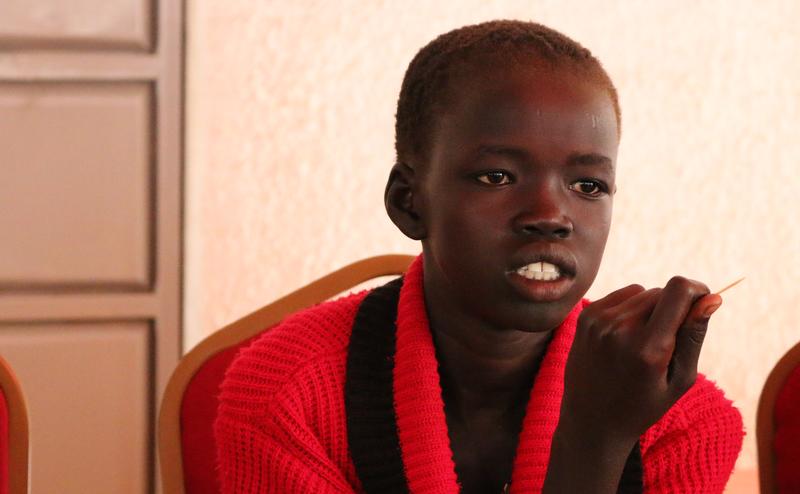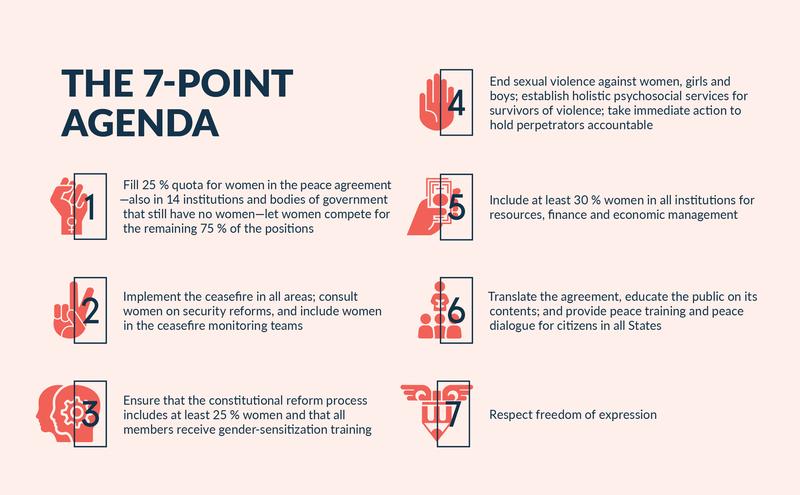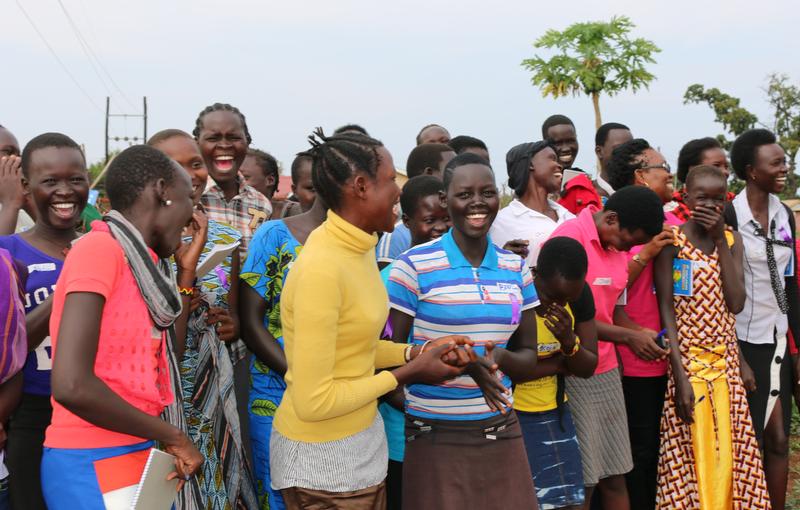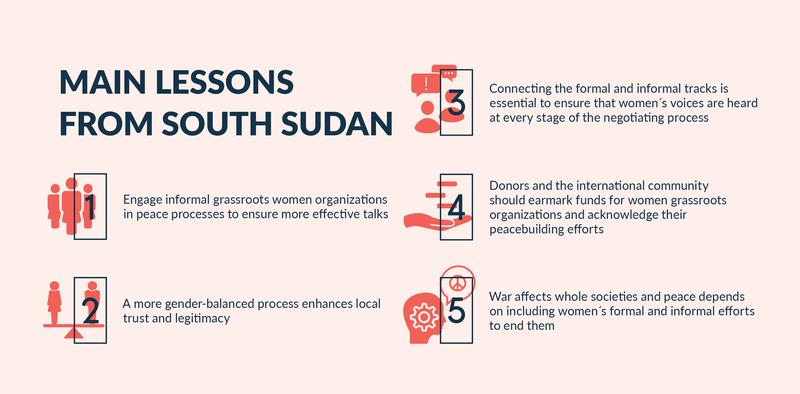Women’s informal peace efforts: Grassroots activism in South Sudan
Women’s role in formal peace processes
Grassroots women’s peace efforts
Ensuring that grassroots women’s voices reach formal peace negotiations
How to cite this publication:
Helen Kezie-Nwoha and Juliet Were (2018). Women’s informal peace efforts: Grassroots activism in South Sudan. Bergen: Chr. Michelsen Institute (CMI Brief 2018:07)
South Sudanese women have been grossly under-represented in formal peace negotiations. However, they have been active in informal peacebuilding at the local level where peace means rebuilding society. Such informal peacebuilding is radically different to formal peace negotiations where male warlords and political leaders in new positions of power divide the spoils of war. This brief describes women’s informal peace work in South Sudan, and shows the extensive and valuable, but often unrecognized work that women’s organizations do. We also look at how women’s roles in formal processes are informed by women’s informal work.
In this study, we conducted individual and focus groups discussions with women activists from groups located in South Sudan and in Uganda. We completed 21 individual interviews, eight focus group discussions (with a total of 111 women) and two community meetings with 90 women in all. The interviews were conducted between June 2017 and July 2018. Fighting between different warring factions caused delays and made it difficult to access study locations.
The long road to peace
South Sudan gained independence from Sudan on 9 July 2011. Since then, South Sudan has been marred by internal conflicts. What started as a power struggle between President Salva Kiir and his deputy, former Vice President Riek Machar, quickly devolved into a war between South Sudan’s two largest tribes, the Nuer and the Dinka. Tens of thousands of people have been killed during the conflict. Of a total population of 13 million, 1.4 million people have been displaced inside the country, and over a million have sought refuge outside the country in neighboring Uganda, Kenya and other countries outside the region.
The conflict disproportionately affects women and girls. Women, girls and children are the majority of those displaced and in need of humanitarian assistance. The responsibility for the family’s well-being in these difficult circumstances places a phenomenal burden on women. Since the war broke out, sexual and gender-based violence has reached unprecedented levels. Over 1300 women and girls were raped between April and September 2015. 1600 women and children were abducted during the same time period in Ler, Koch and Mayendit counties. Sexual and gender-based violence is used to reward fighters for their involvement in the conflict (UNOCHA, 2016).
Women’s role in formal peace processes
The 2015 Agreement on the Resolution of the Conflict in the Republic of South Sudan outlines a ceasefire and a transition to peace period. Women comprised just 15% of negotiators in the peace process. While women were absent from the government delegation, three women served as part of the opposition’s ten-person delegation, including one woman who had fought on the frontlines. The Women’s Bloc of South Sudan – a network of civil society leaders—also served as formal observers and signatories of the 2015 agreement and as members of the Joint Monitoring and Evaluation Commission, who monitored the implementation of the agreement.

In the renewed 2018 peace effort, there is one female mediator. Women constitute 25 % of the official delegates and the South Sudan Women Coalition —a new network of civil society leaders based in South Sudan and surrounding refugee camps—are official participants and observers and also signed the new agreement.
More than 500 women from all States of South Sudan have adopted a 7-point agenda on how to implement a gender-responsive peace agreement since the 2015 agreement on the resolution of conflict and the subsequent discussions around its implementation which began at the National Women’s Peace Dialogue in November 2015. The discussions focused on the importance of integrating women’s voices in the implementation of the peace agreement. Key recommendations for all parties, detailed in the 7-point agenda, which include the need to:

Grassroots women’s peace efforts
In our research, we interviewed grassroots women’s organizations based locally in South Sudan. Their mission is to empower women and to promote women’s rights on a wide range of social, economic and political issues. Most of these organizations are involved in informal peace building activities. These women’s groups stress the importance of women’s meaningful participation in all peace and security processes to ensure that civilians are protected from violence.
The grassroots organizations working on informal peacebuilding do so through every day efforts to reconstruct society. Through practical support, women build peace from below and reconstruct and improve people’s everyday lives. They provide food, shelter, healthcare services, education, economic empowerment and support to victims of sexual and gender based violence. Some of the organizations are formed by internally displaced women and become discussion forums on issues affecting women, like insecurity caused by rebel groups, early pregnancy, and income generating activities.
These efforts also have implications for formal peacemaking. For example, in 2017, hundreds of South Sudanese women marched in silence through Juba, South Sudan’s capital, to call for an end to the conflict. They protested the continued rape and killing of civilians, displacement, and the lack of humanitarian services for people in need. They demanded accountability for atrocities and sexual violence committed by armed groups, security forces, and peacekeepers. The 2015 cease-fire agreement expressly prohibited sexual violence in conflict and included strong commitments to protect civilians and reunify women and children.
In local communities, women’s organizations build coalitions across ethnic divides through different channels in their communities. They combine a message of peace with care for those that have been victims of war. Women organize fasting for peace and interfaith prayer meetings across different denominations and ethnic divides, alongside care for orphans and other victims of war. In prayer meetings, they ask for divine intervention to provide guidance and wisdom to the leaders engaged in the peace process and in their efforts to heal those affected by the crisis.
Women establish peace committees aimed to heal ethnic divides. Traditional leaders meet regularly to discuss issues, mediate conflicts and encourage peaceful co-existence. The peace committees also sensitize communities on alternatives to conflict by hosting regular talk shows on radio and by organizing peace rallies in town.
“We women started the Peace Building Committees as membership organization. Our main objective is to promote home-grown peace by addressing tribalism and promote unity. We advocate for personal peace because if you do not have peace in yourself, then your family, neighbours and entire community will be affected”.
The South Sudan Women’s Empowerment Network run radio campaigns and community dialogues. The community dialogues, also called Peace Forums, bring together different ethnic groups to talk about peace and reconciliation. They also use community drama to communicate peace messages. The dramas show the impact of war on civilians, and on women and children in particular and have increased community involvement.
There has been a special focus on sexual and gender-based violence. Local communities have engaged directly with victims to provide support, protection and job opportunities. This important work aims to re-integrate victims of sexual and gender-based violence into the community through psycho-social support and income generating activities. For example, the South Sudan Women’s Empowerment Network has established “Community Support Networks” that advocate for zero-tolerance of sexual and gender-based violence. They work closely together with social workers who provide victims with psycho-social support and trauma counseling.
Our research echoes the first systematic study of women´s involvement in informal peace processes by the Georgetown Institute for Women Peace and Security, who found that 38 of the 63 post-Cold War informal peace processes involved informal initiatives where women´s groups were actively involved (Verveer and Dayal, 2018).
Challenges
Grassroots peace activists face challenges, not only of continuous insecurity and violence, but also from an authoritarian state. Although they engage in informal activities, they have to register formally as organizations in a difficult registration process. These organizations’ mission is often viewed by the government as anti-government, rather than pro-peace. A participant says:
“We organized a silent march in Juba town. Women put tape on their mouths to signify repression and lack of freedom of expression. We had had posters with messages calling for peace and an end to sexual violence. Our leaders were summoned and threatened by the security agencies.”
Organizing and mobilizing for peace in a militarized context is a challenge for grassroots women activists who feel the pressure of an authoritarian state. They also face challenges in securing international funding.
Women’s Monthly Forum, Displaced Women Groups, Association of Media Women in South Sudan, South Sudan Women Empowerment Network, CEPO, Eve Organisation, Women Peace Association, Women Child Development Project, Voice of Women for Peace and Faith, South Sudanese Network for Democracy & Elections (SSuNDE), South Sudanese Women with Disabilities Association
Ensuring that grassroots women’s voices reach formal peace negotiations
The South Sudan Women Coalition (40 groups and organizations, including women refugees in the diaspora) is a forum for continuous dialogue between grassroots’ women activists and women at the table. The coalition enabled grassroots activists to influence the formal peacebuilding process. A joint South Sudan Women Position on the Promotion of Durable Peace and Reconciliation in South Sudan was developed in September 2017 to guide the engagement of the “women at the table”. The coalition instituted a “preparation mechanism” before each session of the peace talks and a “feedback mechanism” after the peace talks. This allowed grassroots women’s organizations to continuously remind the ‘women at the table’ about key concerns and their accountability to a broader group of grassroots activists, leaders and women in South Sudan.

Higher representation of women in all aspects of peacebuilding, including formal talks, is crucial to developing sustainable peace. In May 2018, alongside the formal peace talks, the South Sudan Women Coalition released a statement calling for 35% representation, a crucial development to putting women’s concerns on the peace negotiations agenda. This call was granted and has had positive ramifications for the peacebuilding process and the inclusion and acknowledgement of women in reconstructing South Sudan.
The demand for inclusion forms part of the larger call for women’s participation and inclusion in peacebuilding, sparked by UN resolution 1325. The resolution is based on research documenting that civil society, including women’s organizations, can make a difference in enhancing peace outcomes when they have been included in peace talks. Civil society brings legitimacy to the negotiation process.
Our research confirms other studies that find that when civil society groups and women´s groups are included in the negotiations, resulting peace agreements are 35 % more likely to last. When civil society actors are included in peace agreements, the risk of peace failing is reduced (Nilsson, 2009).

The ‘Women and Peacebuilding in Africa’ project looks at the cost of women’s exclusion and the possibilities for their inclusion in peace talks, peacebuilding, and politics in Somalia, Algeria, northern Nigeria, South Sudan, and Sudan. The project also examines the struggle for women’s rights legal reform and political representation as one important arena for stemming the tide of extremism related to violence in Africa.
The three themes that make up the project are:
- Inclusion and exclusion in postconflict governance
- Women activists’ informal peacebuilding strategies
- Women’s legal rights as a site of contestation
The ‘Women and Peacebuilding in Africa’ project is a consortium between Center for Research on Gender and Women at the University of Wisconsin-Madison, Chr. Michelsen Institute (CMI) and Isis-Women’s International Cross-Cultural Exchange (Isis-WICCE). The project is funded by the Carnegie Foundation and the Norwegian Ministry of Foreign Affairs.
Further reading
Desirée Nilsson, 2009: “Anchoring the Peace: Civil Society Actors in Peace Accords and Durable Peace,” International Interactions 38, No. 2
Melanne Verveer, Najali Dayal, 2018: “Women Are The Key to Peace, Argument
November, 8, 2018
Sam Mednick, 2017: How Women are Fighting Back in South Sudan´s Epicenter of Rape, Women and Girls, June 16, 2017



